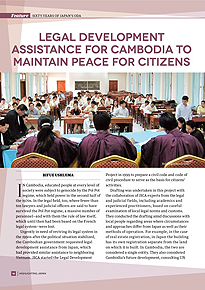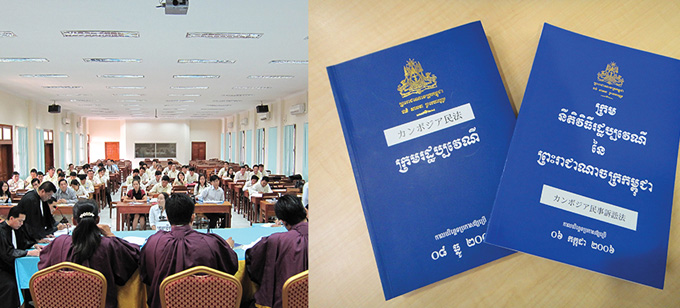Home > Highlighting JAPAN >Highlighting Japan August 2014>Sixty Years of Japan's ODA
Highlighting JAPAN

Sixty Years of Japan's ODA
Legal development assistance
for Cambodia to maintain peace for citizens

In Cambodia, educated people at every level of society were subject to genocide by the Pol Pot regime, which held power in the second half of the 1970s. In the legal field, too, where fewer than ten lawyers and judicial officers are said to have survived the Pol Pot regime, a massive number of personnel—and with them the rule of law itself, which until then had been based on the French legal system—were lost.
Urgently in need of reviving its legal system in the 1990s after the political situation stabilized, the Cambodian government requested legal development assistance from Japan, which had provided similar assistance to neighboring Vietnam. JICA started the Legal Development Project in 1999 to prepare a civil code and code of civil procedure to serve as the basis for citizens’ activities.
Drafting was undertaken in this project with the collaboration of JICA experts from the legal and judicial fields, including academics and experienced practitioners, based on careful examination of local legal norms and customs. They conducted the drafting amid discussions with local people regarding areas where circumstances and approaches differ from Japan as well as their methods of operation. For example, in the case of real estate registration, in Japan the building has its own registration separate from the land on which it is built. In Cambodia, the two are considered a single entity. They also considered Cambodia’s future development, consulting UN model laws on international trade as well as laws of other jurisdictions, and prepared drafts that enabled Cambodia to interact with the international community.
Starting with drafts of the Civil Code and the Code of Civil Procedure, they drew up about twenty relevant civil laws and regulations. Next, they assisted officers of the Ministry of Justice in providing explanations of these bills to get them passed in the Parliament. The Civil Code and Code of Civil Procedure were enacted in 2007, and Cambodia’s new Civil Code formally went into effect in December 2011.
Attorney and JICA expert Miha Isoi, who participated in the project for over five years, had this to say about the difficulties of drafting. “The laws were drafted with the assistance of Japanese legal experts, so I think they are quite similar to Japan’s Civil Code and Code of Civil Procedure. But advisors wrote the draft together with local experts clause by clause while fully taking into account differences in customs, ways of thinking and the like. It was really hard work adapting every single legal term to the concepts which themselves were new and difficult to understand in Cambodian. JICA kept dispatching Japanese legal experts into the Cambodian Ministry of Justice continuously for over ten years, and the Cambodians really trusted us, saying they could learn a lot because Japan’s assistance included thorough explanations on legal and institutional background.”
Of course, the enactment of the laws does not mean the process is over. Training the personnel capable of handling each issue with a proper and systematic understanding of the provisions of the 1,305-article Civil Code is essential. For that reason, there has also been a focus on the training of legal practitioners, experts and other personnel in tandem with legislative development.
Locals involved in drafting bills since the start of the project who are well versed in the judicial process are taking up positions as senior officials in the Ministry of Justice, but there was a shortage of judicial personnel at the working level. Japan therefore provided assistance so that Cambodian people—especially legal professionals such as lawyers, judges and prosecutors, and even university faculty educating the next generation of legal professionals—can implement and develop the law and judicial system independently. These efforts led to the creation of over seven hundred lawyers and over two hundred judges and prosecutors.
In the future, they will also need to revise the legal system to more closely fit to the actual circumstances of society. Ongoing assistance is planned for capacity development of personnel who will be able to take a central role in legal reform at that time.
Laws and their proper implementation are essential for a society where people can live without fear. Japan’s assistance, through the development of the law and judicial system, has hopefully contributed to peace in Cambodia.
© 2009 Cabinet Office, Government of Japan






